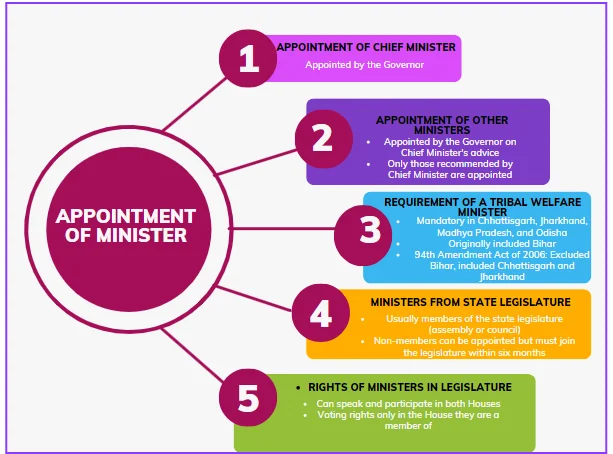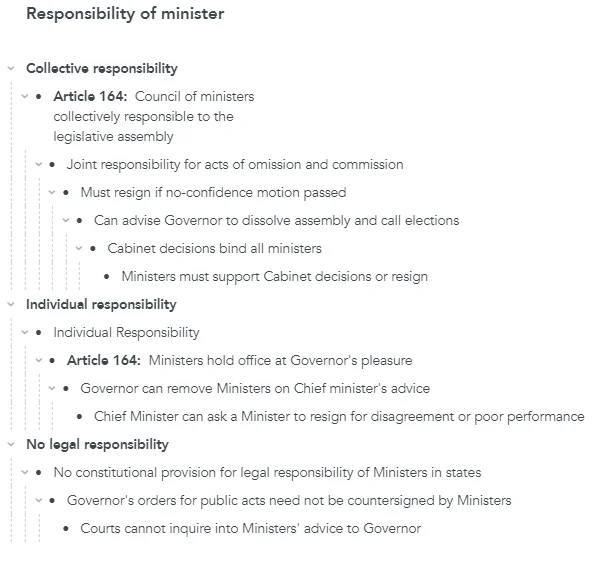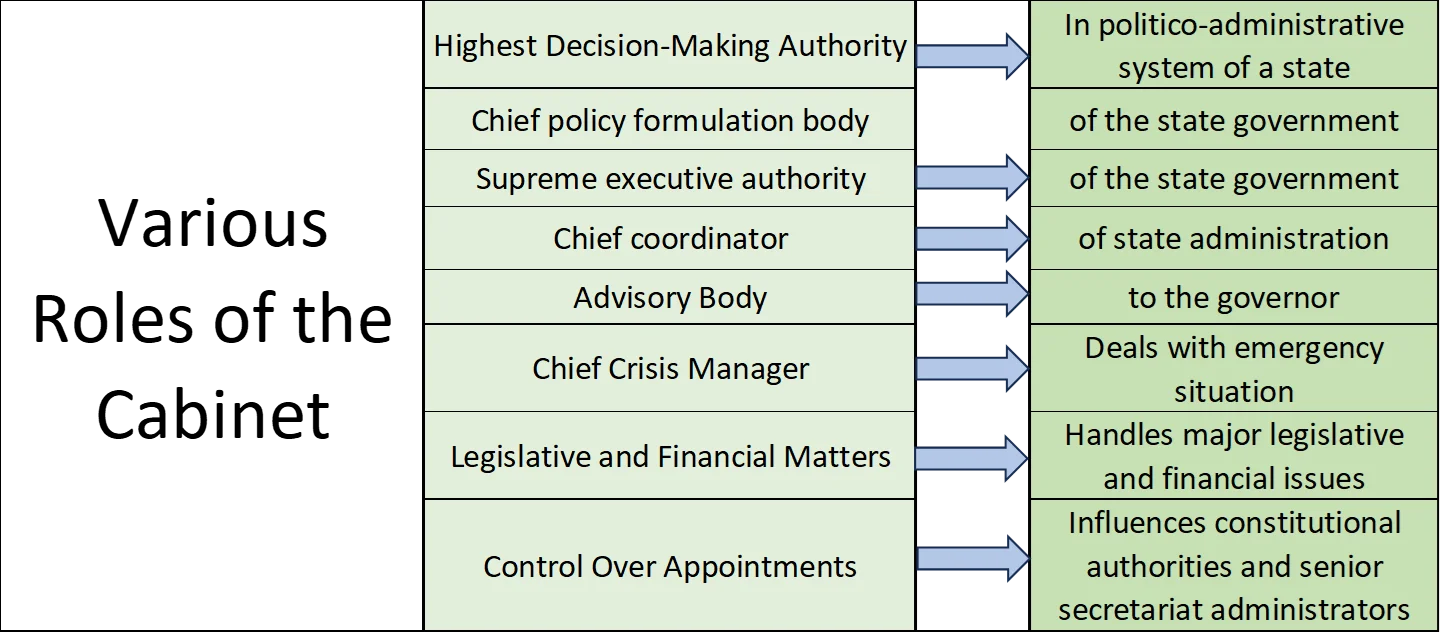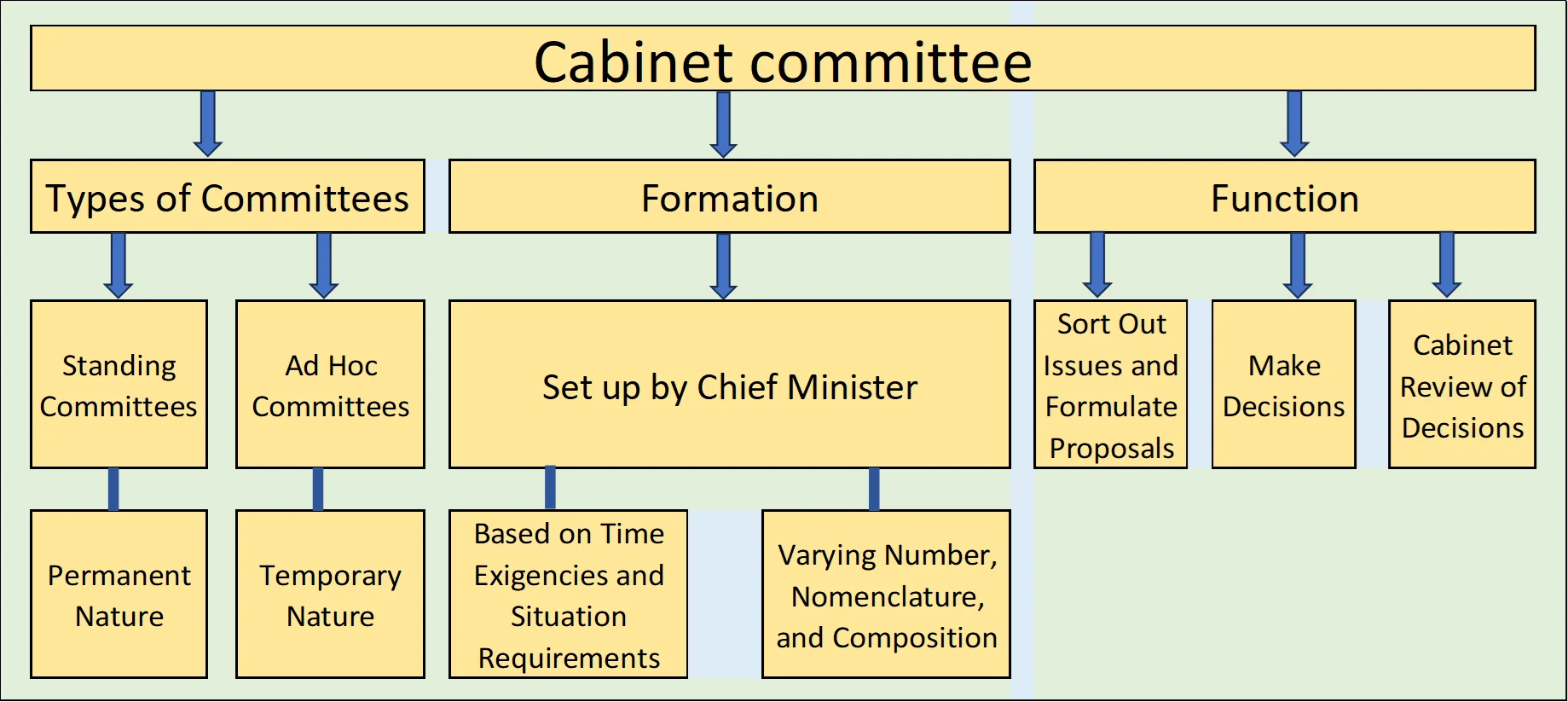The State Council of Ministers in India plays a vital role in the functioning of state governments, similar to the Union Government. Led by the Chief Minister, this Council serves as the primary executive authority, advising the Governor and managing administration. While the Constitution outlines key provisions, the practical operation of the Council reflects a collaborative effort in governance. Understanding these dynamics is essential for grasping the state’s political framework.
Understanding the State Council of Ministers: A Comprehensive Overview
Council of Ministers in India’s Parliamentary Framework
- Establishment of a Parliamentary System: The Indian Constitution establishes a Parliamentary system of government in the states, similar to that of the Union Government.
- Role of the Council of Ministers: In this system, the Council of Ministers, led by the Chief Minister, serves as the primary executive authority in a state’s political and administrative framework.
- Structure and Functioning: This Council is formed and operates in a manner akin to the Council of Ministers at the national level.
- Constitutional Framework: While the Constitution does not elaborate in detail on the principles of the Parliamentary system, it broadly outlines them in Articles 163 and 164.
- Article 163: focuses on the role and status of the council of ministers.
- Article 164: addresses various aspects of the Ministers, including their appointment, tenure, responsibilities, qualifications, the oath of office, and their salaries and allowances.
Enroll now for UPSC Online Course
Constitutional Provisions for State Council of Ministers
- “Article 163-Council of Ministers to Aid and Advise Governor”
-
-
- Council of Ministers headed by Chief Minister
- Advises Governor, except in discretionary matters
- Governor’s discretion final and unquestionable
- Ministers’ advice to Governor not subject to court inquiry
- “Article 164 Other Provisions as to Ministers”
- Chief Minister appointed by Governor
- Other Ministers appointed on Chief Minister’s advice
- Tribal Welfare Minister mandatory in certain states
- Ministerial strength: 15% of assembly strength, minimum 12
- Disqualification on defection grounds
- Ministers serve at Governor’s pleasure
- Collective responsibility to State Legislative Assembly
- Oaths administered by Governor
- Minister ceases if not a legislature member for 6 months
- Salaries and allowances set by State Legislature
-
- “Article 166-Conduct of Business of the Government of a State”
-
-
- Executive action in Governor’s name
- Orders authenticated as specified by Governor
- Rules for transaction of government business
-
- “Article 167 – Duties of Chief Minister”
-
-
- Communicate decisions and proposals to Governor
- Furnish information as requested by Governor
- Submit matters for Council consideration if required
-
- “Article 177 Rights of Ministers as Respects the Houses”
-
- Right to speak and participate in Assembly and Council
- No voting rights for Ministers
Nature of Advice by Ministers as mentioned in Article 163 of the Constitution
- Council of Ministers’ Role:
-
-
- Led by the Chief Minister.
- Tasked to aid and advise the Governor in his functions, excluding discretionary areas.
-
- Governor’s Discretion:
-
-
- Governor’s decision on whether a matter is discretionary is final.
- Actions taken by the Governor under discretion cannot be challenged based on the appropriateness of using discretion.
-
- Confidentiality of Advice:
-
-
- Advice given by the Ministers to the Governor is confidential.
- Courts cannot inquire into the nature of this advice.
- Emphasises a close and confidential relationship between the Governor and Ministers.
- Supreme Court Rulings:
- 1971: A council of ministers must always be present to advise the Governor, even after the State Legislative assembly is dissolved or a council resigns.
- The existing ministry continues until a new one is appointed.
-
- Governor’s Actions:
-
-
- Except in discretionary areas, the Governor must act based on the Council of Ministers’ advice.
- The Governor is not to act personally or against the council’s advice.
-
- Constitutional Requirement:
-
- Where the Constitution requires the Governor’s satisfaction, it refers to the satisfaction of the Council of Ministers, not the personal satisfaction of the Governor.
Appointment provisions related to Ministers in the State Council of Ministers

Oath and Salaries of the Ministers
| Categories of Powers | Related Details |
| Office Oath ( administered by Governor) |
|
| Oath of Secrecy |
|
| Salary and Allowances |
|
| Basic Salary |
|
| Additional Allowances |
|
Composition of the State Council of Ministers
Flexibility in Ministerial Size and Ranking: The Constitution doesn’t specify the size or ranking of Ministers in a state, but the Chief Minister determines this based on the current needs and situation.
- Categories of Ministers: There are three main categories of Ministers:
- Cabinet Ministers: These are senior Ministers who head important departments like Home, Education, Finance, and Agriculture.
-
- They attend Cabinet meetings and play a key role in policy making and overseeing broad areas of state governance.
- Ministers of State: These Ministers may have independent charge of smaller departments or be attached to Cabinet Ministers as assistants.
- They only attend Cabinet meetings when invited for discussions related to their specific departments.
- Deputy Ministers: They assist Cabinet Ministers in administrative, political, and parliamentary duties but don’t have independent departmental charge.
- They are not members of the Cabinet and don’t attend Cabinet meetings.
- In addition to these categories, Deputy Chief Ministers may be appointed for local political reasons and may be included in the Council of Ministers depending on the situation.
Provisions related to the responsibility of Ministers

The State Cabinet
- Core of the State Government: The Cabinet is a pivotal segment of the Council of Ministers, exclusively composed of Cabinet ministers within the state government.
- Leadership and Authority: Led by the Chief Minister, the Cabinet holds significant authority and influence, focusing on key policy matters and state administration.
- Expertise and Decision-Making: Cabinet ministers, each heading specific departments like finance or education, contribute their expertise to informed decision-making.
- Policy Implementation: The Cabinet goes beyond policy formulation, actively participating in the implementation of government policies and ensuring effective execution.
- Cabinet Meetings: Regular or as-needed Cabinet meetings are essential for addressing pressing state issues, strategizing on legislative matters, and coordinating departmental efforts.
- Role of the Chief Minister: The Chief Minister orchestrates Cabinet activities, setting agendas for meetings and guiding the decision-making process.
- Principle of Collective Responsibility: Collective responsibility is a fundamental principle in the Cabinet, making decisions binding on all members, regardless of initial differing opinions.
- Ensuring Unity and Cohesion: This commitment to collective decision-making ensures unity and presents a consistent governmental front, reinforcing the state government’s ability to address challenges cohesively.
Multiple Functions Performed by The Cabinet

Cabinet Committees
Role of Cabinet Committees in State Governance: Cabinet Committees at the state level play a crucial role in the decision-making process.
- Composition of Cabinet Committees: These committees are typically constituted by the Chief Minister and consist of key ministers from the state cabinet.
- Purpose of Cabinet Committees: The purpose of forming these committees is to facilitate efficient governance by distributing responsibilities and focusing on specific areas of administration.
- Variation in Committees: While the specific names and functions of the committees can vary from state to state, there are some common themes and purposes that are often addressed.
- These are:
- Decision-Making: Cabinet Committees are responsible for making decisions on important policy matters, governance issues, and other key areas.
- They act as forums for discussion and deliberation among senior ministers.
- Task-specific Committees: Committees are often formed to address specific issues or sectors such as finance, law and order, infrastructure, social welfare, etc.
- Each committee is tasked with overseeing and providing inputs on matters related to its designated area.
- Decision-Making: Cabinet Committees are responsible for making decisions on important policy matters, governance issues, and other key areas.
- Coordination and Collaboration: The committees serve as a platform for coordination and collaboration among different departments and ministries.
- This helps in streamlining efforts and ensuring a cohesive approach to governance.
- Policy Formulation: Cabinet Committees are instrumental in formulating and reviewing policies related to various aspects of governance.
- This includes economic policies, social welfare programs, and development initiatives.
- Crisis Management: In times of crisis, such as natural disasters or emergencies, special committees may be formed to address the situation promptly.
- These committees focus on crisis management, relief operations, and rehabilitation efforts.
- Inter-State Relations: In states with complex inter-state relationships, committees may be formed to address issues related to border disputes, water-sharing agreements, and other matters that require collaboration with neighboring states.
- Budget and Finance: Some states have committees specifically dedicated to financial matters, including budget formulation, fiscal policies, and economic planning.
- Monitoring and Evaluation: Committees may also be responsible for monitoring the implementation of various government schemes and projects, ensuring that they are progressing as planned.

Enroll now for UPSC Online Course
| Must Read | |
| Current Affairs | Editorial Analysis |
| Upsc Notes | Upsc Blogs |
| NCERT Notes | Free Main Answer Writing |
Conclusion
In summary, the State Council of Ministers is crucial for effective governance at the state level. Through collaboration and collective responsibility, the Cabinet and its committees address various administrative challenges.
- This structure not only supports decision-making but also ensures accountability in the political system.
- A well-functioning Council is essential for aligning state priorities with national goals, fostering overall development.
Sign up for the PWOnlyIAS Online Course by Physics Wallah and start your journey to IAS success today!
| Related Articles | |
| State Council of Ministers in India | State Legislature in India |
| Parliamentary System | Supreme Court |

 GS Foundation
GS Foundation Optional Course
Optional Course Combo Courses
Combo Courses Degree Program
Degree Program










